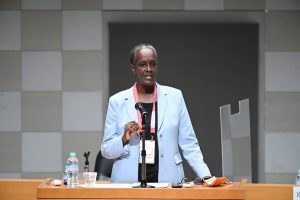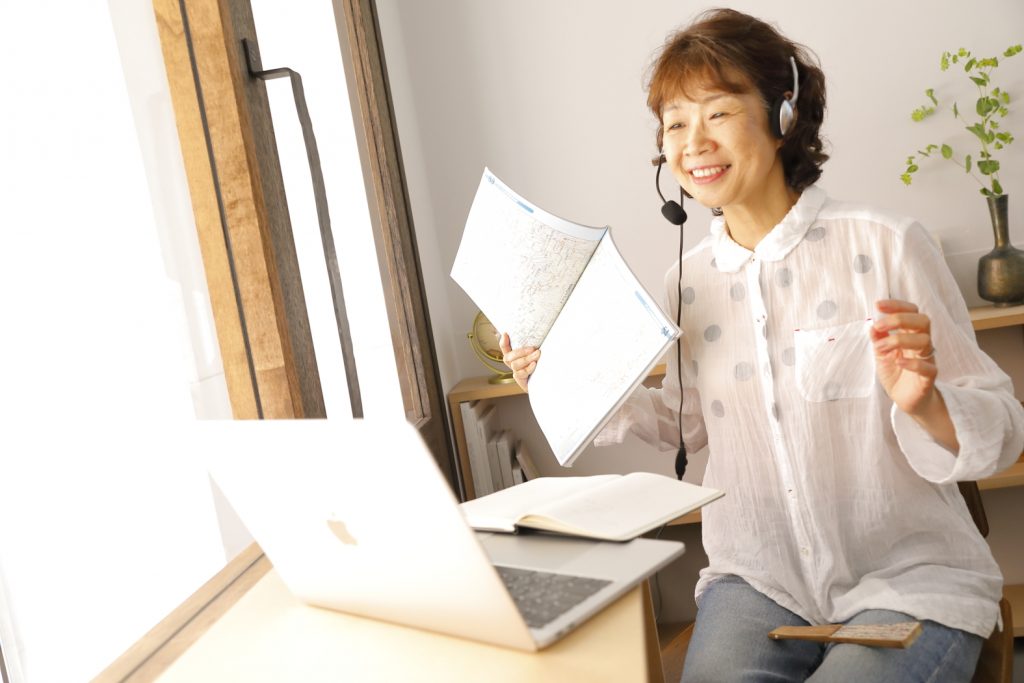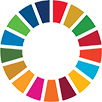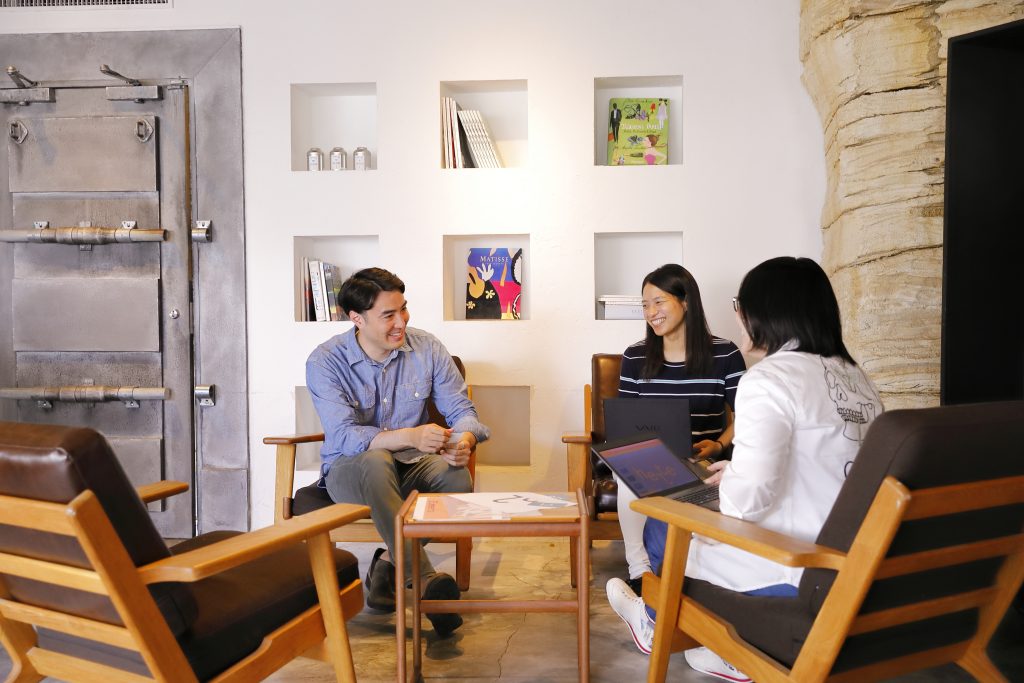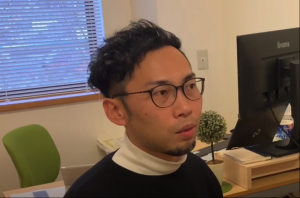October 24th, 14:00-16:15
Kitakyushu International Conference Center – Main Hall
Also Live Streamed in Japanese, French, and English
.
.
Written by: Raluca Mateoc for the SDGs Japan Portal
https://japan-sdgs.or.jp/
Photos provided by @PICSPORTS
The 2021 World Artistic and Rhythmic Gymnastics Championships, Kitakyushu is a first in two aspects. First, as a première in FIG’s history, the Championships were run one after the other in the same host city: Kitakyushu, Fukuoka Prefecture, Japan. By offering to do so, the city and the FIG gave gymnastics a new opportunity and raised its value and recognition in several aspects. In a second avant-garde move, the Championships raised the value of sports through the promotion of the United Nations’ Sustainable Development Goals (SDGs) which the City ofKitakyushu also pioneers in Japan.
Gender equality (SDG5) is the first goal promoted by the FIG, raising the value of sport from a form of competition to social contribution. The board members and staff of the Local Organizing Committee rejoiced from strict gender equality. At the same time, a Gender-Equality Forum – a side event of the Championships -made gymnastics a role model for other Olympic sports by demonstrating the achievement of gender equality across the sport. The city invited Lydia Nsekera, the chair of the IOC Women in Sport Commission, to lead this inspiring event.
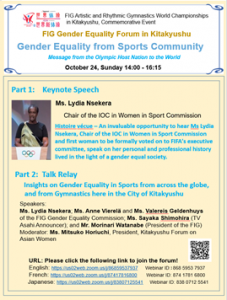
Together with the keynote speaker, the forum conveners, FIG President Watanabe Morinari (Japan), FIG Gender Equality Commission members Valereis Geldenhuys (Namibia) and Anne Vierelä (Finland), Sayaka Shimohara (Japan) announcer at TV Asahi, and moderator Mitsuko Horiuchi (Japan) internationally renowned consultant and researcher on gender issues, gathered an inspiring crowd and gained momentum for achieving gender equality in all gymnastics environments.
Background
Gymnastics (especially rhythmic gymnastics) is often referred to as a highly appealing sport for women, indeed being one of the rare Olympic sports that enjoys higher popularity among women than among men. However, the gender balance in the sport’s governing bodies sometimes does not mirror this reality. Breaking the gender gap at the highest governance level in sports as in all society is an ongoing challenge, and the FIG has continuously paved the way for this move.
Gender equality has been a priority for the FIG since 2018, when gender quotas at FIG elections were introduced, with a mechanism requiring a 30% female representation for Executive, Council and Leadership roles.
Several elected positions – for Vice-Presidents, Executive Committee members and Council members, as well as the members of the Gymnastics for All Committee and the technical committees for Trampoline, Acrobatic and Aerobic Gymnastics – opened the way for more women in leadership positions. To stand for election, candidates must be endorsed by their national member federation, which must declare the application to the FIG beforehand (For more information regarding the elections, please check the FIG Statutes).
Amongst others, FIG President Morinari Watanabe initiated actions encouraging women to be more involved and make themselves heard within the sport’s governance by setting up the Women in Gymnastics Commission, updated in 2019 as the Gender Equality Commission. In the same year, an inaugural gymnastics leadership development program held in St Petersburg, Russia, was attended by 50 women. Valereis Geldenhuys, honorary president of the Namibian Gymnastics Federation, reveals the undercurrents of this program. “We took all the potential leaders in the FIG and focused on a number of extra young people. So, it wasn’t just for the leaders but also for the young people. But we used the opportunity to prepare the leading women for these specific coming elections.”
In November 2020, the FIG Friendship and Solidarity Competition held in Tokyo gathered two teams – team Friendship and team Solidarity – each made of 8 female and 8 male athletes, balanced in gender as well as national representation. In 2021, the Commission finalized a 4 year-long Gender Equality Action Plan for Gymnastics aiming to achieve gender equality across all aspects of gymnastics.
The 2021 FIG Gender Equality Forum in Kitakyushu
The FIG enthusiastically renewed its engagement at the Gender Equality Forum in Kitakyushu, which revealed how FIG operates at different levels towards gender equality, setting up a role model in both sports and society.
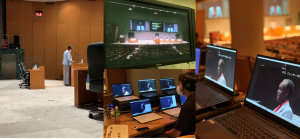
Gender equality is a key goal for the FIG, which continuously sets policy frameworks to ensure its practice at all levels. The FIG educates those who participate in gymnastics about the importance of gender equality. Non-discrimination and inclusivity are key works for the action plans of the FIG. In executive and leadership positions, the role of women and men are balanced, whereas for the gym sport itself, FIG aims to achieve equal participation at all levels, for athletes, coaches, administrators, and judges.
However, a gap analysis reveals that women were underrepresented in leadership and senior management positions across the sport – especially in Middle East and Asia. At the same time, there are extremely high levels of female participation in artistic gymnastics, rhythmic gymnastics, acrobatics, and aerobics while male participation in rhythmic gymnastics and aerobics stands extremely low.
FIG sets out realistic targets for filling this gap and brings to light the benefits of gender equality, in both sports and society. Gender equality always supports social and economic progress and benefits women who, historically, did not have equal rights to men, and shows that better skills achieve personal, societal, and organizational benefits. In sports, it creates safe and secure environments, improves diversity, and creates better service outcomes. In gymnastics, it decreases drop-out rates of females, avoids sexist gender stereotypes, and creates a positive culture, being more attractive to both genders in the end.
The speakers of the forum set the stage for action in favour of gender equality, pointed at the aspects which need change in both sports and society, and reviewed the achievements of FIG in this respect.
The Forum interventions
Every individual, regardless of gender, shares equal responsibilities and opportunities and can make decisions together in all matters. Gender determines things, rather than individual abilities. This is the idea around which the Gender Equality Forum revolved.
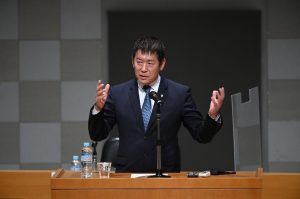
.
1 Morinari Watanabe, FIG President
Mr. Morinari Watanabe, FIG President, and vice chair of the women in sport commission of IOC shows that in this world championship, the FIG is promoting the SDGs and gender equality, which not only promotes human rights for women, but also enables them to take part in the political decision-making process and thereby fosters a sustainable society for the entire mankind.
Nevertheless, the issue of gender equality comes with numerous barriers. In the global gender gap report where 153 countries are surveyed, Japan ranks 121st. The Japanese government has tackled for years the gender equality issue in terms of discussions, debates, and actions. However, this year, there was an incident after which people came to realize the need for gender equality in society in Japan. Before the opening of the Tokyo 2020 Olympic Games, Mr. Yoshiro Mori, the former prime minister, and the head of the organizing committee made remarks that made people realize the importance of society to be more gender equal. The strong hope is that these gymnastics championships will make a great contribution to the creation of a gender equal society.
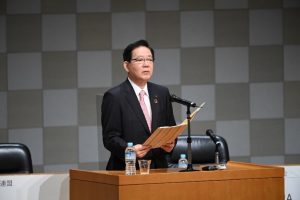
.
2 Mr. Kenji Kitahashi, Mayor of Kitakyushu
Mr. Kenji Kitahashi, the mayor of Kitakyushu, shows that today’s theme – gender equality – is SDG theme number 5, a critical theme for the international community. This year, at the Tokyo Olympics and Paralympic Games, diversity was an important word, and one of the underlying philosophies of diversity is gender equality.
Back in 2018, Kitakysuhu City was chosen by the OECD as the first agent model city for the SDGs promotion and, also by the Japanese government to be the future city for the SDGs. One of the city’s strategies is gender equality and the creation of a space where all people can flourish, and, also, where people with disabilities can participate. Also, women participation is an important policy for the city, and the participation of women in policy decisions will be higher. Currently, women account for 53 % in the city affiliated in committees. This topped to 50% in 2017 for the first time among cities in Japan. To mobilize the entire society, the systems, norms, and practices must change, and this Forum is the opportunity for changing one’s behaviour.
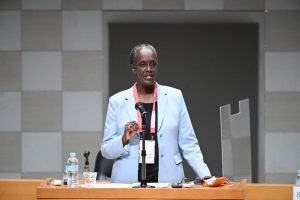
.
3 Ms Lydia Nsekera, Committee Chairman, IOC Sports and Womens Commission
Ms Lydia Nsekera from Burundi Africa, is the keynote speaker of the Forum, Committee Chairman of the Sports and Women Commission of the IOC and from 2009 a member of the IOC Committee. She was awarded with the African female sports award from the IOC, and in FIFA she was chosen as a female member of the directors’ board for the first time in the world. At IOC she is a Chair of the Sports Commission and has been a commission member for the adjustment of the Tokyo Olympics and a member in many other committees.
She points out the difficulties of the political context in Burundi when passing from a kingdom to a republic after 1952. Her father had been imprisoned for 14 years for political reasons and his presence and encouragement was like a guiding light for her future activities. In 2017 she entered the IOC Burundi and in 2004 she entered the was heading the Football Federation.
She had kept the dream of her mother, to be a role model at 11 years old for her sisters and brothers and followed her words which said that she should not be afraid to say something if it is important.
Ms Lydia Nsekera believes that gender equality must be promoted by teamwork between men and women, and that it takes courage. The leader needs to have self-confidence, should be impeccable, and have self-mastery and sense of security and curiosity. While at the same time, sense of justice and equality is as important. “We have a patrimonial system, and I am a widow, and I am not the first to speak in social events, but in the world of sport I take the first word. If you have things to say you have to say it – so I spoke up.” (Ms. Lydia Nsekera) At the same time, the media has a great role to play, in going to the villages, and changing mentalities.
Relay Talk
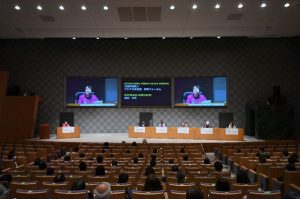
.
4 Kitakyushu International Conference Center
Ms Mitsuko Horiuchi, President of the Kitakyushu Forum on Asian Women (KFAW), former Assistant Director-General of the International Labour Organization (ILO) and, an internationally renowned consultant and researcher on gender issues and issues involving work, labour and employment, takes the lead as Moderator of the Relay Talk titled “Discussions from Kitakyushu on Gender Equality in Sports”.
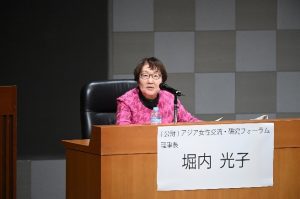
.
5 Ms Mitsuko Horiuchi, President of the KFAW
Ms Horiuchi opens the session with enlightening the audience on how rare an occasion it is to have so many representatives from top ranking countries of the Gender Gap Index. She introduces the fact that half of the speakers represent top ranking countries, with Ms Vierelä from Finland that ranks 2nd in the Index, from Namibia that ranks 6th Ms Geldenhuys, and our Keynote speaker Ms Nsekera from Burundi that ranks 26th on the index that covers a total of 156 counties. And as a side note, the other 3 speakers are from Japan, that finds itself in the 120th position of the index, sandwiched between Angola and Sierra Leone. Due to the high constraints in time, she without further ado invites the speakers into the start of the session.
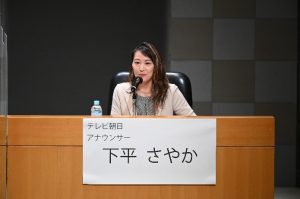
.
6 Ms. Sayaka Shimohara, announcer at TV Asahi
Ms. Sayaka Shimohara, announcer at TV Asahi, experienced with co-hosting numerous popular programmes, narration, as well as MCing, contributes as first speaker with an episode that has recently led her to take action to encourage breaking stereotypes of women, particularly for wives of athletes. She starts off by sharing that she is married to is Jono Hisayoshi of the professional baseball team Hiroshima Carp. On March 8th , International Women’s Day this year, she gave a talk about the balance between family and career, and in an interview by a newspaper just after was asked if she as a wife to a professional baseball player was good at cooking. She explains that this question provoked her hopes to create a different picture and ideal of what is imagined as a wife to professional athletes. Of course, some are good at cooking, at chores, but professional player and the teams are quite independent and knowledgeable about nutrition, so the wives may have less cooking and housework to do compared to other households, she explains. “Being good at cooking may be an illusion of women that was created by men, but I want to say that cooking is not a necessity, and that there are a multitude of different ways of supporting our husbands, as is the same with the husband supporting the wife. I think it is important to break the stereotype and bias in this context, and accept that we shouldn’t enforce one’s own ideal on others, and deprive them of their freedom to be able to create in their own image the couple’s being. I hope to create a different picture and ideal” (Ms. Sayaka Shimohira).
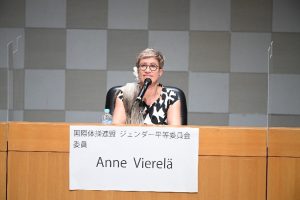
.
7 Ms Anne Vierelä, member of the FIG Gender Equality Committee
Ms Anne Vierelä, member of the FIG Gender Equality Committee and, also of the Finnish Olympic Committee, shows that Finland stands all the time between top 3 and top 5 concerning gender equality. Defining gender equality is a big cultural question, and not any country in the world has achieved complete gender equality, whether we are talking of sport or of other topics.Ms Vierelä has a good position in Finish sport to see how things are in terms of gender equality, as a president of the Finnish Gymnastics Federation for 6 years. The gymnastics have one of the biggest sport organizations in Finnish sport and a 50% women and 50% men representation in the national committee tells a lot about gender equality attitudes in Finnish sport life, but also in Finland.
In terms of worldwide gymnastics, after the summer Olympic Games in Tokyo, gender equality is making a progress on the world stage. Reaching it demands long term work, and persistence, some cultural changes, not fast wins, or quick prizes. But we are on the right way. The gender equality topic needs to be a topic of every single education, for coaches, judges, administration and so on. The speaker shows that we must encourage all genders in gymnastics to take part in leadership education and leadership programs, and here a sentence of Simone Biles is quoted, namely “we must encourage girls to continue their careers as a gymnast, as a judge, as a coach, as a sport leader.” At the same time, the FIG media is absolutely a key to increase knowledge on the importance of gender equality.
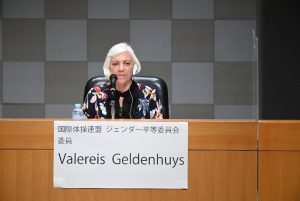
.
8 Ms Valereis Geldenhuys, member of the FIG Gender Equality Committee
Ms Valereis Geldenhuys, member of the FIG Gender Equality Committee shows that the FIG is stronger when our attitude is to really work together. Her focus was on a summary of what FIG’s Women Commission and then Gender Commission did for promoting the development, the education and everything in the FIG to satisfy the gender representation quota.
The first focus of the FIG Gender Equality Commission goes towards achieving gender equality in gymnastics sports. Some of gymnastics’ sports are for men, some are for women, but in most cases, it’s men and women together. At the moment, actually, we have a few more women because of rhythmics, but when we get to parkours they may know more. Then, the Commission works very hard to promote the educational qualities and the skills.
Nonetheless, FIG works for a Census and could see what was happening in Africa, Asia, Pan America, and Oceania and where there is a shortage of men and women. With the statistics at hand, you can make a difference, as if you have got the knowledge and the facts, you can change and create a safe, secure, and diversified environment.
The four key areas of change
The FIG’s policy action for sports and society is translated in four intertwined key areas by the FIG Gender Equality Commission, which act like an umbrella for the 148 national member federations worldwide.
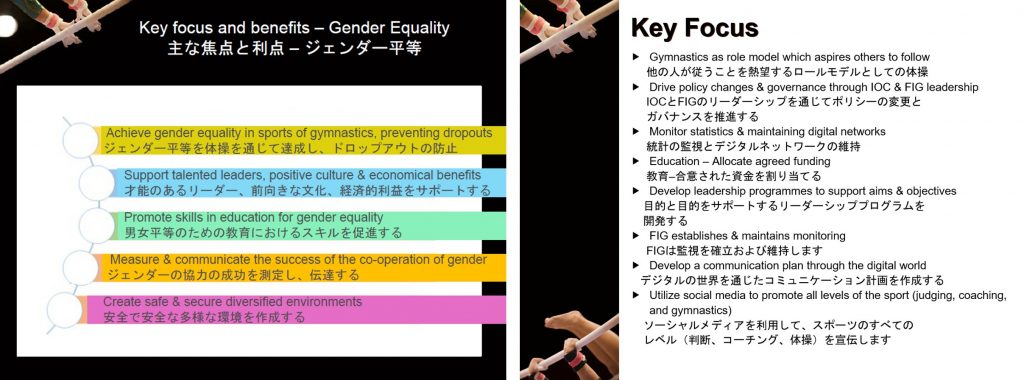
.
9 FIG Gender Equality Commission Presentation Slides
Changing governance culture
Changing the governance culture of the FIG is the first key target, achievable by reviewing governance structures across all gymsports to determine barriers to entry. Gender quotas are maintained, and progress is tracked publicly. At the same time, gender biased training at all levels of the sport is undertaken.
“Differences between countries are huge, and this is stimulating and impressive. Change really demands from every country persistence and short-term work. Some countries are really at the beginning, so it is one topic you need to take care of when putting it on the table. Men and women together, we are much richer and much better – we have to do all things together.”
(Anne Vierelä) Valereis Geldenhuys shares this view. “Because the men are the strongest to catch the gymnasts, but the woman are strongest in dancing execution, they need to work together as a force. We would like to enhance the future in the FIG to be more balanced, to represent every continent, and to represent gender, but mostly to ensure qualified, well-equipped people to run our Federation. I see men and women around working to make this event a success.” Some concrete steps have been taken – at the next FIG General Assembly in Turkey in November 2021, Statutes say that each attending country’s delegation should consist of a man and a woman.
Maintaining leadership talent
Second, FIG will develop and maintain a pipeline of leadership talent, by creating and maintaining networks to encourage gender equality and diversity in all aspects of gymnastics. Mentoring, identifying talent and developing leadership training are the key actions.
Lydia Nsekera, IOC member and one of the 1st women in FIFA on the executive committee spoke about how she has achieved her goals, pointing out at the persistent need for a change in mentalities and at the essential role of education. “Especially for young people, who asked if they could send questions, it was an important forum. Gymnastics is a sport with a can-do attitude.” (Lydia Nsekera)
In terms of the athletes, the gender balance of 50 / 50 has nearly been achieved: “for artistic gymnastics, you have men and women, whereas for the rhythmic, there are mainly women, but some men have started to do rhythmic too. Aerobics has less men and more woman whereas for the parkours – our new sport – there are more men than women. So, if you look at the average, that has really been balanced up. Also, for the judges, men are starting to judge women’s artistic, men are starting to judge rhythmic, so even in the technical side the equality is starting to happen.” (Valereis Geldenhuys).
Education and support for gender equality
Third, FIG engages with promoting strong education and support for gender equality, by sharing best practice across the gymnastics community. “The education commission of the FIG will come with a syllabus where we can enhance education through courses in every continent. Then, a statistics base is set up where all the statistics in every continent are compiled. In the next years, by 2024, we will work on the achievement of a 50 – 50 % gender balance in governance.” (Valereis Geldenhuys)
In her greatly inspiring intervention, the keynote speaker Lydia Nsekera focused on the primordial role of education in reaching out a leadership position, and on her parcourse since her entry into the world of sports. The seeds of education and courage make every thing possible. “I come from the world of football, and I revealed my difficulties since my first entry into the Federation offices and during the time I was campaigning with men until becoming president of the Football Federation in 2004 and I insisted a lot on education. Without the education received from my parents, who taught me not be afraid of society’s prejudices, I could not have had access to my current positions. Thus, I insisted a lot, as my mom and dad insisted that I should trust myself, always do it. And to go apart with it and leave the prejudices. When I talk to young women, I insist on education. Without education, I could not have reached the point I am at today, I could
not even have been president of the National Football Federation as I was going to abandon from the first day.” (Lydia Nsekera)
Measuring and communicating the success
Finally, FIG aims to measure and communicate the success, by using social media to promote gender equality successes and establishing a Complaints Process. The voices/needs of athletes, coaches, judges, and administrators will be heard and instances where gender equality fails will be identified.
The need for gender equality is called out stronger than ever. “I hope that this message will be delivered to all national gym federations and I think our voice will be stronger after this. It was the 1st time in world championships that we had this kind of forum – it was more like an Asian women forum but, in the end, it could be specifically for participating countries.” (Anne Vierelä)
The FIG is dedicated to the development of Gymnastics worldwide and to the organization of its official events, governing Gymnastics for All, Men’s and Women’s Artistic Gymnastics, Rhythmic Gymnastics, Trampoline – including Double Mini-trampoline and Tumbling, Aerobics, Acrobatics and Parkour.
Overall, the FIG re-affirmed its engagement with gender equality at 2021 World Artistic and Rhythmic Gymnastics Championship in Kitakyushu, showing that women bring different approaches and ways of thinking that are valuable to any international organization, especially an international federation governing a sport with such strong female participation.



